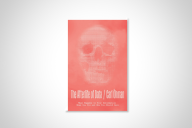You have /5 articles left.
Sign up for a free account or log in.
On Aug. 10, the City Council of Cambridge, Mass., passed, by unanimous vote, a resolution to which even the local media gave scant notice. But the document merits attention throughout the Republic of Letters, and quoting it at some length seems in order, since paraphrase would not do it justice:
“WHEREAS: George Scialabba is retiring on Aug. 31, 2015, from his job stationed in the basement of Harvard’s Center for Government and International Studies, having diligently fulfilled the room scheduling needs of overpaid professors for 35 years; and
“WHEREAS: Scialabba has published over the same period nearly 400 essays, reviews and commentaries concerning literature, science, politics and morality from the perspectives of the bemused, the nonprivileged and the unsmug; and
“WHEREAS: To that end, Scialabba has spent thousands of hours pacing his apartment on Washington Avenue, gnashing his teeth over the sorry spectacle of American politics and the fearful mayhem of American capitalism, while himself hanging on by his fingertips,
“NOW THEREFORE LET IT BE RESOLVED: That the City of Cambridge hereby proclaims Sept. 10, 2015 ‘George Scialabba Day’ to honor Scialabba for staring unflinchingly into the abyss and reporting what he has found there in sensitive, true and graceful prose …”
In 2006, this column did its part to further the appreciation of George Scialabba by giving notice of Divided Mind, a sampler of his work in the form of a chapbook, issued by a small literary press called Pressed Wafer. Divided Mind was modest both in size and prize run, but it whetted enough readers’ appetites for the publisher to bring out What Are Intellectuals Good For? in 2009. Two more collections have appeared since then; a fourth volume is on its way. (All available through online retailers or the press itself.)
To continue with the Cambridge City Council proclamation, picking up where the ellipsis left off:
“RESOLVED: That the City of Cambridge encourages those of its residents who still practice the habit of reading to place their collective tongues in their collective cheeks and to celebrate the achievements of George Scialabba on Sept. 10, 2015; and finally
“RESOLVED: That the city clerk is hereby requested to forward a suitably embossed copy of this resolution to the Committee to Preserve George Scialabba and Others Like Him (If Any).”
And so Noam Chomsky and Barbara Ehrenreich will be among the featured speakers tomorrow night at “Three Cheers for George Scialabba,” to be held at the Brattle Theatre in Cambridge. Tickets for the event were sold out as of Sunday. And that was before the Boston Globe’s prominently placed feature on the event. (Large blocks of tickets were purchased by well-read but ruthless scalpers, according to the rumor I just thought up.)
The Committee to Preserve George Scialabba consists, as far as I can tell, mainly of John Summers, editor of The Baffler, where Scialabba is a contributing editor. In an email note he describes the planned course of Thursday night’s festivities as a series of toasts by speakers -- running “anywhere from 10 to 15 minutes or so” each, followed by a hoisting of the glasses -- which will be interspersed with the screening of a video consisting of tributes by friends and readers who can’t attend. It will be made available online the next day.
“The toasts will branch out from [George’s] person,” Summers says, “into the larger, collective issues and situations of contemporary intellectual life. We will focus on the persistence of independent-minded writing and thinking outside the professions and institutions -- the sort of people who don't need to ask permission.” (Summers has been named by Scialabba as his literary executor and will presumably handle the Library of America edition of his essays.)
So much acclaim would swell the heads of most people. My impression from speaking with Scialabba by phone is that he is happy but embarrassed and will likely remain in that state for the duration. As a young man he was a member of Opus Dei -- a Roman Catholic organization primarily for laymen, known for its unyielding advocacy of theological tradition. And although studying intellectual history as a Harvard University undergraduate eventually cost him his religious faith (“the foundations had been crumbling all through my junior and senior years”), it seems that the years of quasi-monastic discipline mortified the ego right out of him.
The experience of leaving a closed but rigorous moral and intellectual worldview left him in a position that has been difficult and, at times, painful, but also rewarding, at least for his readers. It taught him “that ideas matter,” the historian Rick Perlstein writes in the preface to Scialabba’s next book. “That they are a matter of life and death …. He believes that achieving freedom, whatever the generals on CNN and the editorialists of The Wall Street Journal say, is neither a function of American arms or the sacred working out of the laws of supply and demand. It is caused by human beings exercising their reason, autonomously, from the ground up.”
The title of that forthcoming volume is Low, Dishonest Decades: Essays and Reviews, 1980-2015. The indicated span happens to coincide with the years Scialabba has been a clerical worker at Harvard, managing the building that houses the Center for International Affairs and a number of smaller research centers. Part of the legend that circulates among his admirers concerns a file cabinet in his basement office that was filled with all the writing he'd done when not busy scheduling room usage or checking on the progress of air-conditioning repairs.
It turns out that not only is the story true but that the files are still there. Clearing them out remains his last workplace-related chore. He says there are no unfinished books among them, or manuscripts for posthumous discovery -- and that with Low, Dishonest Decades, most of the work he’d want preserved will be between covers, apart from a few recent essays. I was disappointed to hear that, at least initially.
But now he has a good pension (“thanks to the Harvard Union of Clerical and Technical Workers,” he stresses) and more time. So let me end by repeating what I said in the video that will be shown on Thursday night: while the world is not exactly crying out for more memoirs, an exception can be made for the memoirs of someone who joined Opus Dei as a teenager and read his way out of it. The tributes to George Scialabba will soon be over; let his late-life flourishing begin!








